Managing SEO for large organizations is challenging, especially when multiple tools and systems need to work together. Choosing the right enterprise SEO platform depends on how well it integrates with existing tools like Salesforce, HubSpot, and Google Analytics. This article compares five platforms - BrightEdge, Conductor Searchlight, Siteimprove, seoClarity, and Semrush - based on their integration capabilities, features, pricing, and suitability for enterprise needs.
Key Highlights:
- BrightEdge: Strong CRM and BI integrations; ideal for revenue-focused reporting but comes at a high cost starting around $100K annually.
- Conductor Searchlight: Excellent for content workflows with CMS integrations like WordPress and Adobe, but limited technical SEO tools.
- Siteimprove: Great for technical SEO and compliance, but less focused on content optimization.
- seoClarity: Transparent pricing ($3,200–$4,500/month) with robust APIs but requires technical expertise for setup.
- Semrush: Affordable entry point ($449.95/month) with broad features but can feel overwhelming for new users.
Quick Comparison:
| Tool | Integration Strengths | Pricing Structure | Advantages | Limitations |
|---|---|---|---|---|
| BrightEdge | Deep CRM/BI connections | ~$100K+ annually | Revenue-focused reporting | High cost, long onboarding |
| Conductor | CMS integrations | $3K–$25K/month | Content-focused insights | Limited technical SEO features |
| Siteimprove | Technical compliance tools | Custom enterprise pricing | Multi-domain monitoring | Slower crawls for large sites |
| seoClarity | Flexible APIs | $3,200–$4,500/month | Clear pricing, custom integrations | Technical setup required |
| Semrush | All-in-one platform | $449.95/month+ | Broad feature set, affordable entry | Overwhelming interface, less depth |
Each platform has strengths and weaknesses. BrightEdge excels at linking SEO to revenue, Conductor supports content-driven teams, and Siteimprove focuses on technical SEO. Meanwhile, seoClarity offers customization, and Semrush provides an accessible all-in-one solution. The right choice depends on your organization's priorities, budget, and technical needs.
Moz Pro vs. Conductor: Which SEO Tool Is Right for You? 🔍 | In-Depth Review & Comparison
1. BrightEdge
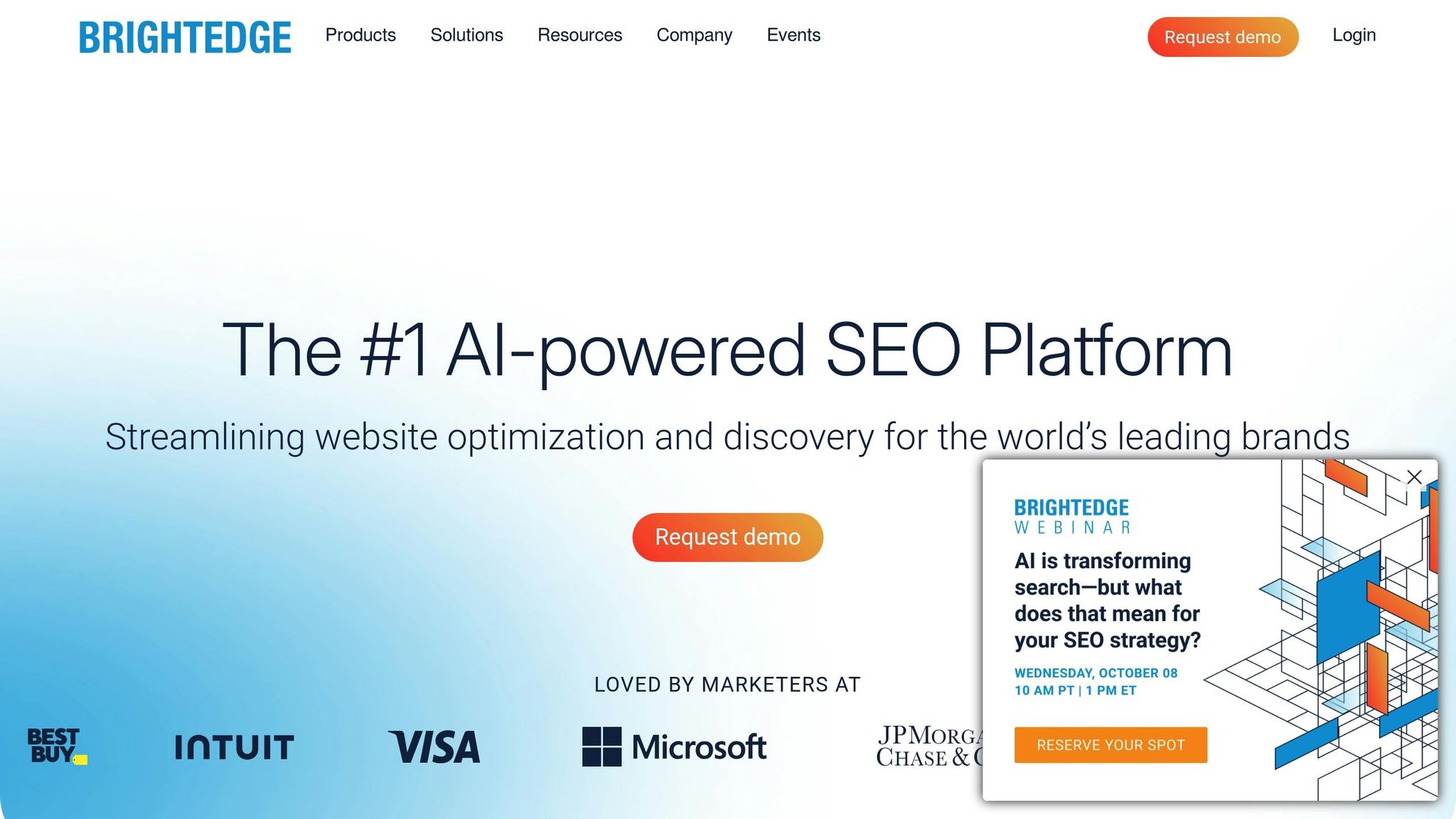
BrightEdge is an advanced SEO platform tailored for large-scale businesses, offering smooth integration with numerous analytics and marketing tools. It supports thousands of connections with key systems like Salesforce, allowing users to embed SEO data directly into their existing workflows. With its powerful API, BrightEdge ensures that performance metrics are accessible and actionable across various platforms. By breaking down data silos, it consolidates analytics from different marketing channels, creating a unified view of performance. These integration features make BrightEdge a standout choice when evaluating similar solutions.
2. Conductor Searchlight
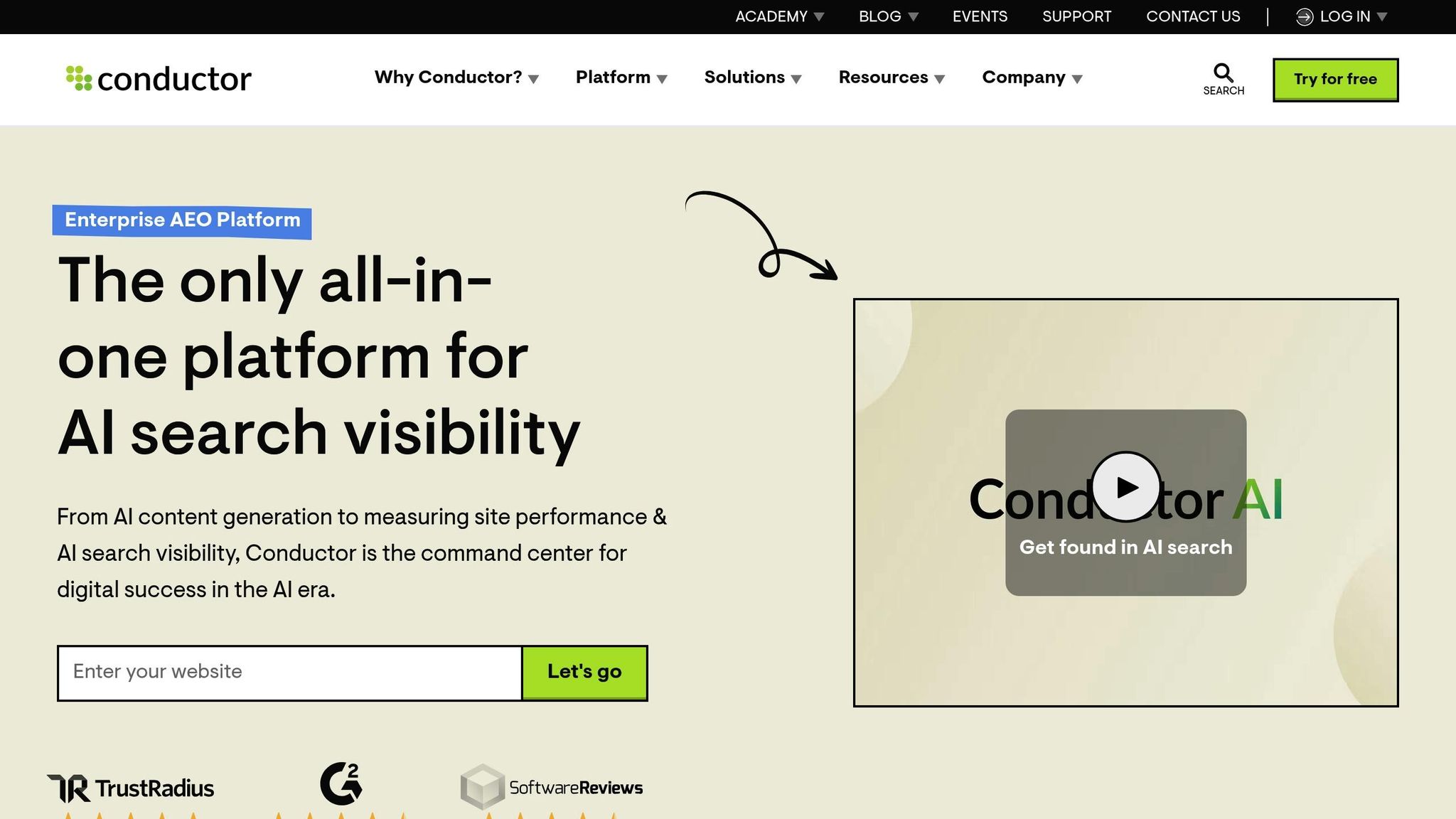
Conductor Searchlight is a platform designed to optimize content by blending SEO insights with CMS and marketing automation tools. Its API framework enables seamless data integration, making it a go-to solution for large organizations aiming to streamline reporting and strategic decisions.
Integration Capabilities
Conductor Searchlight works smoothly with popular CMS platforms like WordPress, Drupal, and Adobe Experience Manager, as well as marketing automation tools such as HubSpot, Marketo, and Pardot. These integrations allow teams to embed SEO recommendations directly into their content workflows.
The platform’s API-first design supports custom integrations, letting teams connect proprietary systems and feed SEO data into analytics tools like Tableau and Power BI. By also integrating with Google Analytics 4 and Adobe Analytics, it enhances attribution modeling, making it easier to measure the impact of organic search.
These integration capabilities form the backbone of Conductor Searchlight’s advanced features.
Key Features
- Content Performance Tracking: Tracks metrics like keyword rankings, click-through rates, and engagement, automatically syncing this data with connected platforms.
- Workflow Automation: Sends alerts via Slack, Teams, or email when performance metrics dip, helping teams respond quickly.
- Competitive Intelligence: Monitors competitor content strategies and integrates insights into project management tools such as Asana and Monday.com.
Pricing Structure
Conductor Searchlight operates on a custom enterprise pricing model. For mid-market organizations, pricing starts at around $3,000 per month. For larger enterprises, costs typically range from $8,000 to $25,000 per month, depending on how many keywords, content pieces, and integrations are needed.
Enterprise packages include implementation services and access to a dedicated customer success team. However, additional expenses may arise for custom API development or advanced integrations that go beyond standard offerings.
Advantages and Limitations
One of Conductor Searchlight’s standout strengths is its focus on content optimization. This makes it particularly useful for organizations with extensive content teams and intricate publishing workflows. The platform is excellent at linking content performance to business outcomes, helping marketers demonstrate ROI for their efforts.
Its integration capabilities are well-suited for content-driven workflows, but the platform has its limits. For example, it lacks robust tools for technical SEO monitoring and site performance tracking. Companies that need in-depth technical audits might find it insufficient as a standalone solution.
Another drawback is data synchronization delays, which can hinder real-time decision-making, especially for enterprises managing thousands of keywords across multiple domains during high-traffic periods.
While Conductor Searchlight excels in content optimization, it may not be the best fit for businesses focused primarily on e-commerce SEO or technical performance, where more specialized tools might offer a better feature set. However, its content-centric approach sets it apart in the realm of enterprise SEO tools.
3. Siteimprove
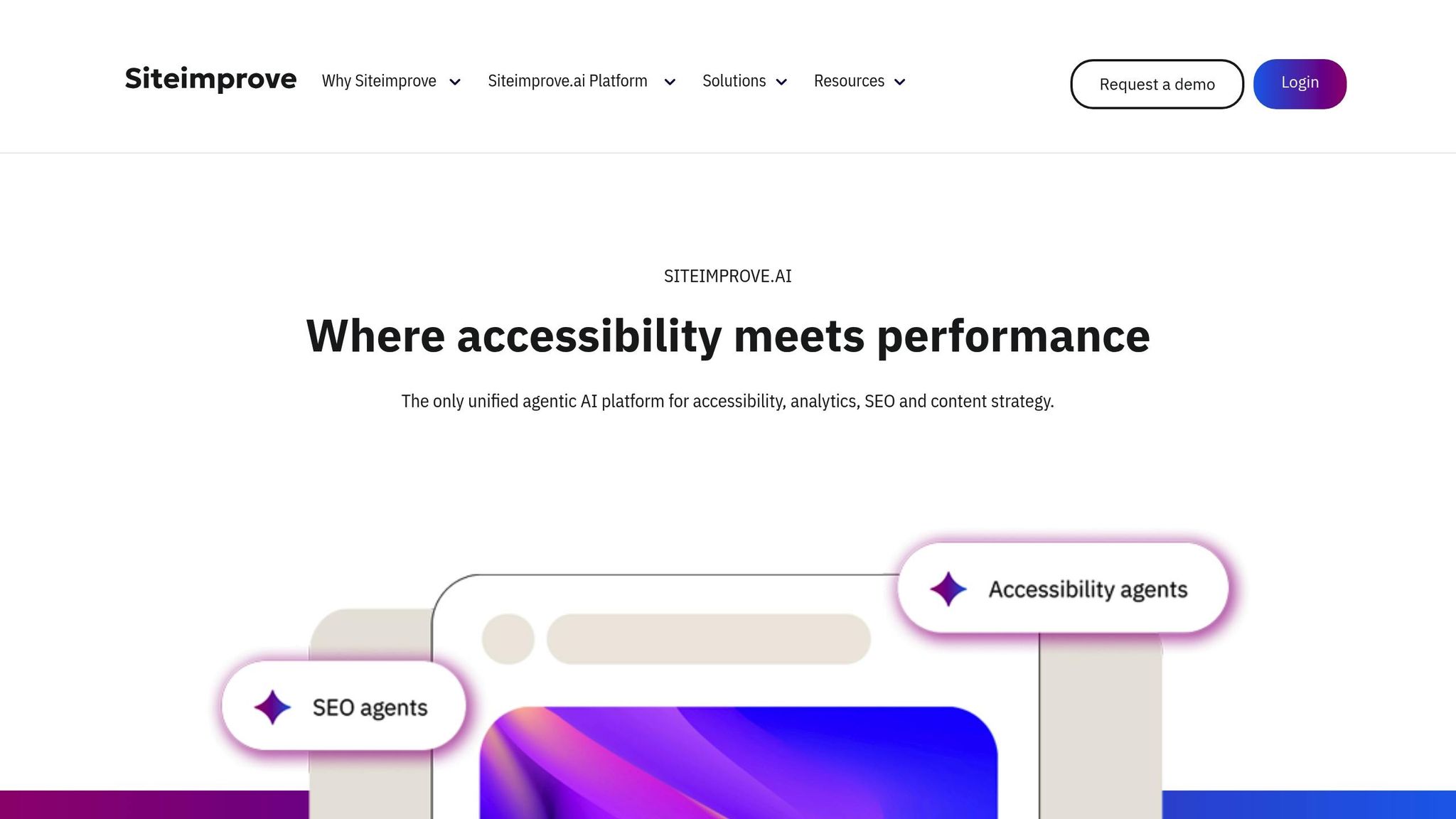
Siteimprove is an all-in-one digital platform tailored for large organizations, combining tools for SEO, accessibility, quality assurance, and analytics.
Integration Capabilities
Siteimprove stands out for its ability to connect with a variety of third-party platforms, making it a versatile choice for enterprise SEO. It offers pre-built connectors for popular CMS platforms like Drupal, WordPress, Sitecore, and Adobe Experience Manager, allowing for quick and straightforward integration without heavy technical work.
Its API-first design extends to marketing platforms such as Salesforce Marketing Cloud, Oracle Eloqua, and Microsoft Dynamics, bridging the gap between SEO insights and tools like lead scoring and customer journey mapping.
The platform also aligns SEO efforts with accessibility standards by integrating with accessibility tools, ensuring both compliance and a better user experience. For broader analytics, Siteimprove connects with BI tools like Looker, Qlik Sense, and Power BI, enabling users to merge SEO metrics with other performance indicators through custom dashboards.
These integrations enhance the platform's core functionality, providing actionable insights that drive better decision-making.
Key Features
Siteimprove offers a range of features designed to simplify digital optimization:
- Quality Assurance: Automatically scans websites to detect issues like broken links, spelling mistakes, and outdated content. It integrates with project management tools such as Jira and Azure DevOps, enabling teams to create tickets for fixes directly from the platform.
- Content Optimization: Evaluates page performance against competitors and provides recommendations for improvement. This feature includes a readability scoring system that factors in both SEO and accessibility, helping content teams create materials that rank well and are easy to understand.
- Multi-Site Management: Ideal for enterprises, this feature allows users to monitor SEO performance across multiple domains from a single dashboard. Data can be segmented by brand, region, or business unit, offering detailed insights for large-scale operations.
- Policy Compliance: Ensures that SEO changes align with brand guidelines and regulatory requirements, which is especially important for industries with strict content regulations.
These features work together to streamline workflows and maintain consistency across large, complex digital ecosystems.
Pricing Structure
Siteimprove uses a subscription-based pricing model, with tiers based on the number of pages monitored and the features included. The Professional tier is designed for smaller-scale operations, while Enterprise packages offer advanced integrations, custom reporting, and dedicated support.
Implementation costs vary depending on the complexity of integration, and discounts may be available for multi-year contracts. Additional fees apply for optional add-on modules, giving organizations flexibility to tailor the platform to their needs.
Advantages and Limitations
One of Siteimprove's biggest strengths is its ability to combine SEO, accessibility, and quality assurance into a single platform. This reduces the need for separate tools and helps eliminate data silos across departments. Automated monitoring and alerts further save time, especially for teams managing large, intricate websites.
However, the platform does have its limitations. While it covers the essentials of SEO, it may not offer the more advanced keyword research or competitive analysis found in specialized SEO tools. Additionally, site crawls for very large enterprises can be slower, potentially delaying decisions during time-sensitive projects like site migrations.
New users may also face a learning curve, particularly those primarily focused on SEO. As with other enterprise tools, Siteimprove aims to balance robust features with usability, but mastering its full potential may take time for some teams.
sbb-itb-5be333f
4. seoClarity
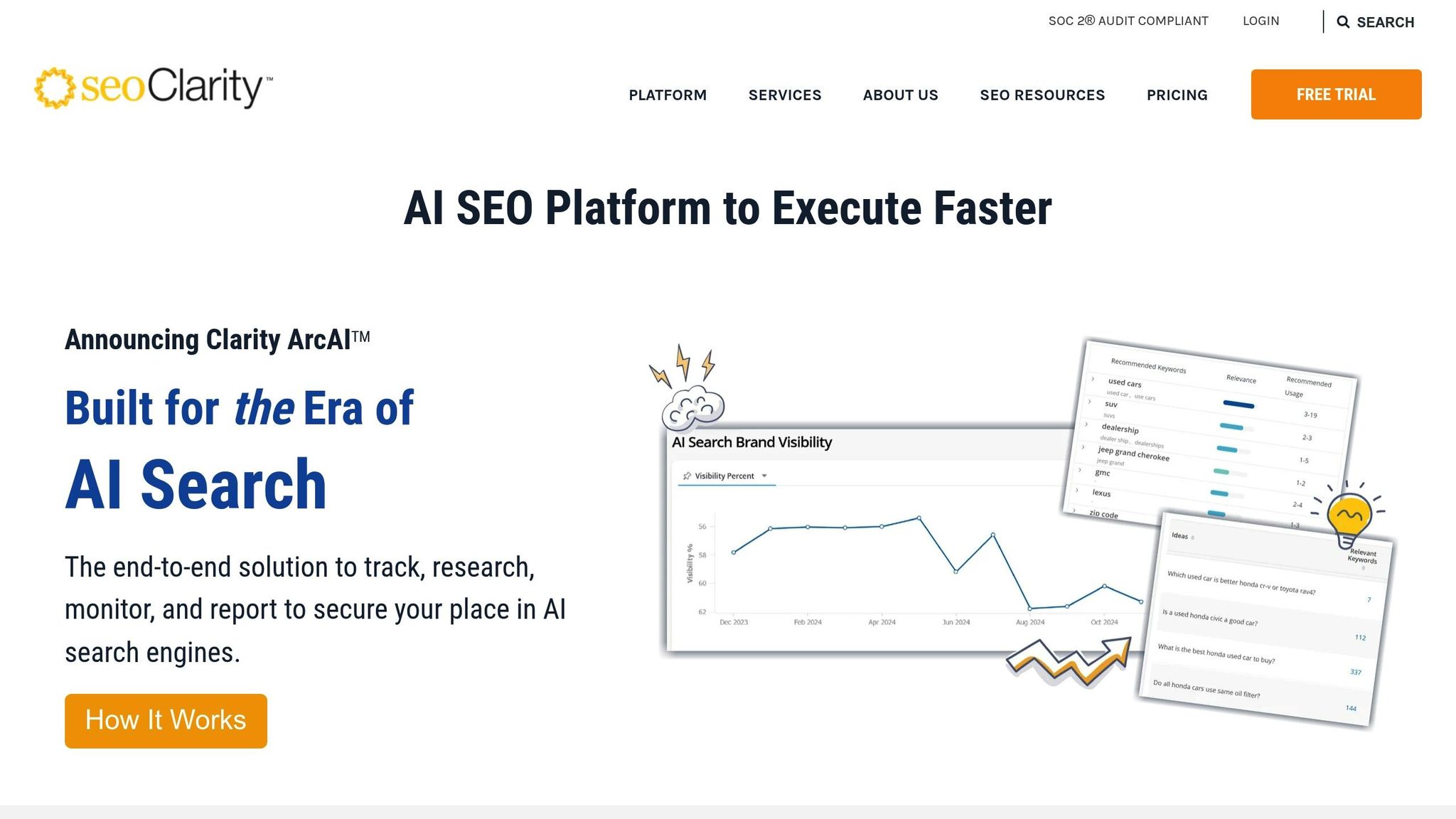
seoClarity is a robust enterprise SEO platform designed to work seamlessly with HubSpot. By integrating with HubSpot, it feeds SEO data directly into marketing automation workflows, helping teams incorporate these insights into their broader digital strategies. This integration highlights seoClarity's focus on aligning SEO performance with the goals of enterprise marketing.
5. Semrush
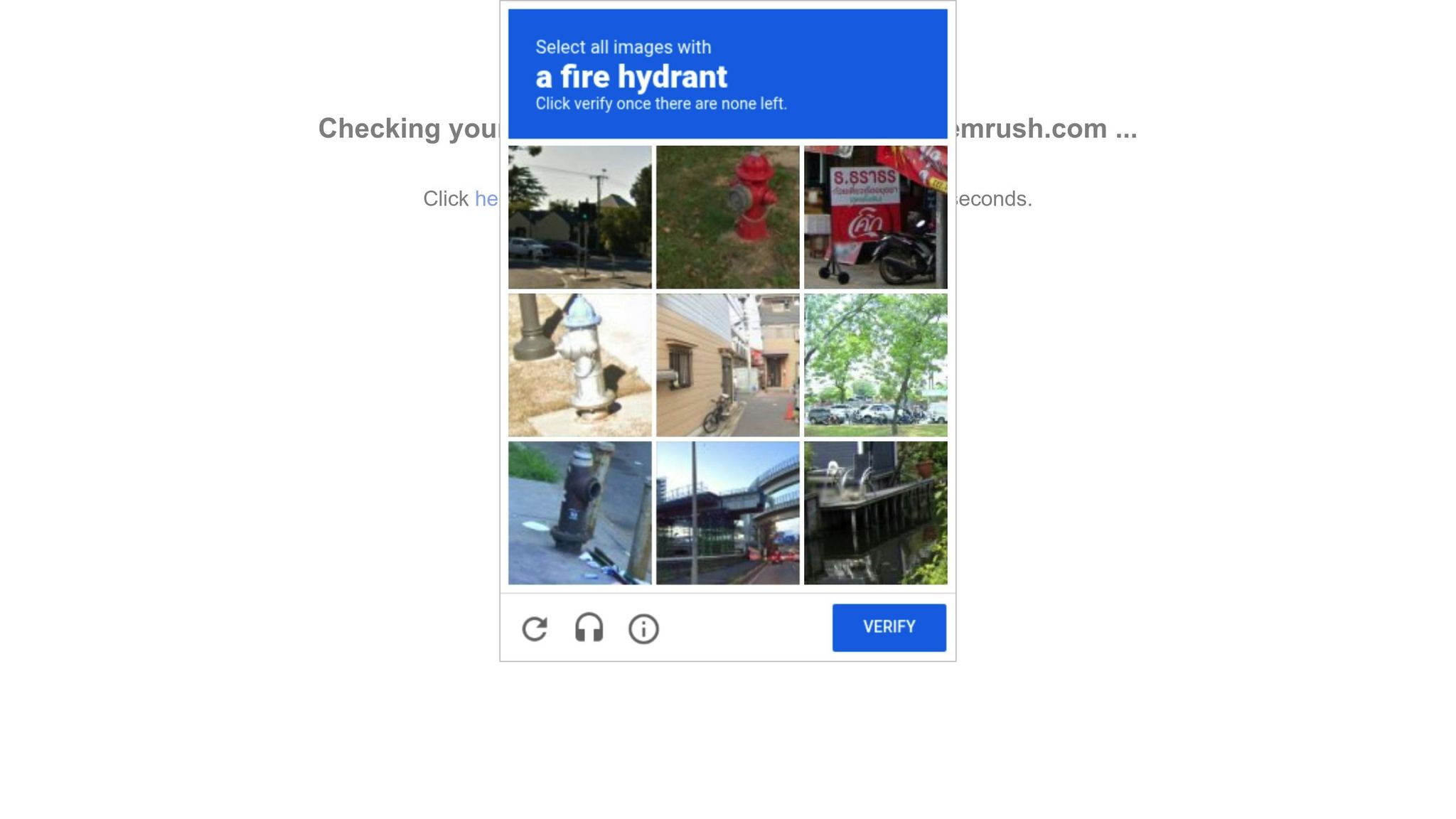
Semrush stands out as a powerful enterprise platform offering a wide range of tools and integrations. It’s designed to connect seamlessly with major marketing systems, CRMs, and content management platforms through both built-in integrations and API connections.
Integration Capabilities
Semrush provides advanced data connections that unify insights from organic and paid search campaigns. It integrates directly with key platforms like Google Analytics, Google Search Console, and Google Ads, making it easier to track performance. For enterprise teams, the platform connects with tools such as HubSpot, Salesforce, and WordPress, streamlining workflows and automating reporting processes.
With its API functionality, Semrush allows businesses to create custom integrations with their proprietary systems. This means teams can pull keyword rankings, backlink data, and competitor insights directly into their existing dashboards. This level of customization is especially valuable for organizations with complex marketing tech stacks.
Key Features
Semrush brings a robust toolkit to enterprise SEO efforts. It offers keyword data spanning over 20 billion queries across 130+ countries, along with competitive analysis tools to track rivals and uncover content gaps.
Its Position Tracking and content optimization tools provide detailed insights into rankings across devices and locations. The backlink analysis feature helps teams monitor link profiles, research competitor backlinks, and identify quality link-building opportunities. Progress can be tracked through intuitive reporting dashboards, keeping everyone on the same page.
Pricing Structure
Semrush has a straightforward subscription approach. The Business plan, starting at $449.95 per month, includes essential features like historical data, extended usage limits, and API access - ideal for most enterprise needs.
For larger organizations, Semrush offers tailored plans with perks like dedicated account managers, custom reporting, and higher data limits. Annual billing options are available, offering discounts for businesses looking to commit long-term.
Advantages and Limitations
Semrush’s biggest strength is its all-in-one approach. It simplifies SEO management by combining a broad set of tools under one roof, reducing the need for multiple software solutions. Its global database coverage is a major plus for companies running international campaigns, and frequent updates ensure users have access to the latest tools and features. Customizable dashboards also make it easy to share insights with stakeholders.
That said, the platform isn’t without its challenges. Its extensive suite of tools can feel overwhelming for new users and may require a significant learning curve. While it covers a wide range of SEO needs, some advanced technical SEO features might not go as deep as specialized tools. Pricing can also add up, particularly for companies needing multiple user accounts or large-scale data access.
Another consideration is data accuracy, which can vary by region. While Semrush excels in English-speaking markets, coverage in some international areas might not be as comprehensive. Additionally, its focus on breadth sometimes comes at the expense of depth in niche SEO areas.
Comparison Summary
Looking at these tools side by side helps clarify which one fits your specific integration requirements and budget. By evaluating their strengths and limitations, businesses can make more informed decisions tailored to their priorities.
BrightEdge stands out for its executive reporting and strong BI integrations. With connections to tools like Salesforce and Tableau, it’s perfect for organizations looking to link SEO performance directly to revenue. That said, its hefty price tag (starting around six figures annually) and lengthy onboarding process may be hurdles for some.
Conductor Searchlight excels in fostering collaboration across SEO, content, and demand generation teams. Its CMS integrations with platforms like Adobe, Sitecore, and WordPress simplify content workflows. However, it may not offer the advanced technical SEO automation that development-heavy companies might need.
Siteimprove is geared toward technical SEO automation and compliance monitoring, making it a great option for enterprises managing multiple domains with complex technical needs. Its strength lies in pinpointing and prioritizing technical issues at scale, though it places less focus on content analysis.
seoClarity offers straightforward pricing, starting at $3,200 per month for its Core plan and $4,500 for the Professional tier. This transparency helps with budget planning, and its robust API capabilities support extensive custom integrations. However, implementing its features often requires technical expertise.
Semrush provides an all-in-one feature set, with its Business plan starting at $449.95 per month. While this makes it an affordable starting point, its enterprise-level custom pricing can scale higher. Its wide-ranging tools reduce the need for multiple solutions, though new users might find its interface overwhelming, and it lacks depth in certain niche areas.
Here’s a quick reference table summarizing each tool’s key strengths, pricing, advantages, and limitations:
| Tool | Integration Strengths | Pricing Structure | Main Advantages | Key Limitations |
|---|---|---|---|---|
| BrightEdge | Deep BI/CRM connections | Custom pricing; starts ~$100K+ annually | Revenue-focused reporting, AI optimization | High cost, long onboarding |
| Conductor Searchlight | CMS platform integrations | Custom pricing, 30-day free trial | Excellent team collaboration | Limited technical SEO automation |
| Siteimprove | Technical compliance, multi-domain management | Custom enterprise pricing | Strong technical SEO focus | Less focus on content analysis |
| seoClarity | Robust APIs, custom integrations | Transparent: $3,200–$4,500/month | Clear pricing, high customization | Requires technical expertise |
| Semrush | All-in-one platform | Business plan: $449.95/month; custom enterprise plans | Comprehensive tools | Overwhelming for new users, less specialized |
Each platform brings something different to the table, so the best choice depends on your organization’s priorities. For instance, if tying SEO to revenue is key, BrightEdge might be worth the investment. For collaboration and content workflows, Conductor Searchlight could be the better fit. Meanwhile, Siteimprove is ideal for technical SEO needs, seoClarity offers customization and clear pricing, and Semrush provides an accessible entry point with broad functionality.
Budget is another critical factor. While BrightEdge comes at a premium for its executive-level features, seoClarity provides transparency that helps with financial planning. For those looking for a lower-cost option, Semrush’s Business plan offers an affordable way to get started, even if larger organizations may eventually need a custom plan.
Integration styles also vary widely. BrightEdge and seoClarity excel in offering custom API access and deep integrations, while Conductor Searchlight focuses on pre-built CMS connections. Semrush strikes a balance, offering solid integrations with major marketing tools, making it a flexible choice for diverse enterprise needs.
Conclusion
Choosing the right enterprise SEO tool boils down to your organization's specific needs in terms of integration, pricing, and setup requirements.
Budget matters. Some tools come with hefty price tags for advanced features, while others provide more flexible, scalable pricing options. Make sure the tool aligns with your financial plan.
Integration is crucial. Look for tools that work seamlessly with your existing systems like CRM, BI, or CMS platforms. This ensures your SEO data connects with broader business insights. For teams managing multiple domains or compliance-heavy industries, strong automated technical SEO capabilities are often a must-have.
Implementation varies. Some tools involve lengthy onboarding processes, while others are designed for quick deployment. Depending on your team's capacity and timeline, this could be a deciding factor. If you’re looking to expand your toolkit, consider exploring complementary SEO tools to cover additional needs.
For more ideas, check out The Top SEO Marketing Directory, where you'll find a curated list of tools for technical SEO, content optimization, and link-building.
Ultimately, your decision will hinge on whether you prioritize specialized functionality or a more versatile tool. Take the time to weigh each platform’s features, pricing, and ease of integration to find the perfect match for your goals.
FAQs
How can I choose the right enterprise SEO tool to integrate with my organization's existing platforms?
To pick the best enterprise SEO tool, start by focusing on options that can easily work with your existing marketing platforms, like your CRM or analytics systems. Look for features such as open APIs, real-time data syncing, and automation capabilities to ensure everything runs smoothly and efficiently.
It's also important to choose a tool that can grow alongside your business. Check if it can manage large datasets, facilitate teamwork across departments, and fit into your broader marketing strategy. By carefully evaluating these aspects, you'll find a tool that not only complements your current setup but also helps improve your digital marketing efforts.
What should I consider when comparing the pricing of enterprise SEO tools?
When looking at the pricing of enterprise SEO tools, it's essential to weigh the features and services offered. Key aspects like content optimization, technical SEO capabilities, keyword research tools, and analytics can significantly impact both the cost and the overall value of the tool.
Another critical consideration is the pricing model. Whether the tool operates on a monthly subscription, charges a project-based fee, or bills hourly, you'll want to ensure it fits within your budget and aligns with your business objectives. For reference, enterprise SEO services typically cost between $11,500 and $21,500 per month, with premium plans often including advanced features and dedicated support.
By carefully analyzing these factors, you'll have a clearer picture of whether a tool strikes the right balance between cost and value for your organization.
How important is technical knowledge for using enterprise SEO tools, and which ones are best for teams with limited expertise?
Technical know-how is key when it comes to maximizing the potential of enterprise SEO tools, especially those tailored for advanced users. For instance, platforms like Botify and DeepCrawl are powerful but often demand a strong grasp of technical SEO to take full advantage of their capabilities.
That said, not every team has deep technical expertise, and that's where more approachable tools come in. Solutions like SEMrush and SE Ranking offer user-friendly interfaces and automation features that simplify even the more complicated tasks. These platforms are perfect for teams aiming to achieve results without diving into the technical weeds, making them a great choice for businesses prioritizing efficiency and ease of use.


